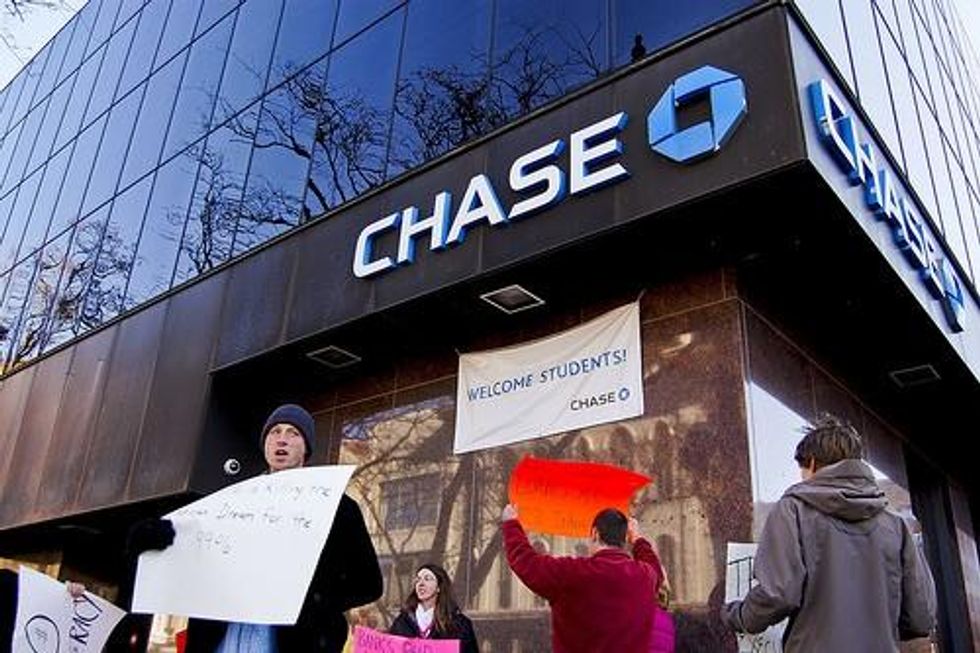A Chastened Morgan Chase?
It's been a really great year for Jamie Dimon. As folks who follow such things know, he's the chairman of the board of JPMorgan Chase and the chief executive officer of the bank. He almost wasn't. In May the bank held its annual meeting in Tampa Florida and there was some thought that shareholders might think that Mr. Dimon should not hold both positions.

In July 2013 the bank settled the Electricity-Market case. The case arose out of allegations that the bank's Houston-based electricity-trading desk made $125 million in unjust profits out of its activities in California and Midwest electricity markets during the preceding two years. The settlement was the result of an enforcement order entered by the Federal Energy Regulatory Commission. As part of the settlement the bank admitted no wrongdoing. (In those kinds of settlements the people paying the big bucks usually decline to admit to any wrongdoing. They just pay to make the problem go away.) In this case the bank's non-wrongdoing ended with it paying $410 million dollars. Of that amount, $285 million was a fine and the rest was disgorgement of profits the non-inappropriate behavior generated. For the bank that was nothing more than a drop in the bucket since it typically has net earnings in the billions of dollars.
Another non-problem for Mr. Dimon (although that may yet change) was the welcome news in August that although the bank was being investigated in China for its hiring practices in that country, it was not yet being charged with violating U.S. laws prohibiting bribery. The China story suggested Morgan Chase officers working in China may have hired children of powerful Chinese officials in order to curry favor with officials who were in a position to, and did, award lucrative contracts to the bank. Whether the actions of the bank in hiring relatives of those in a position to bestow business on the bank were violations of the anti-bribery laws in the U.S. time will almost certainly tell us.
On September 19, 2013, the bank got welcome news that another matter that had been vexing it for some time had finally been resolved. On that date it was announced that the bank had settled a matter with the Consumer Financial Protection Bureau by agreeing to pay a $309 million fine for defrauding customers. As a result of the settlement we learned that the bank was billing customers for services it wasn't providing. In addition to agreeing to pay the fine, it also agreed to give refunds to the customers it had cheated. And as if getting that bit of unpleasantness behind it wasn't enough for one day, that day brought another piece of good news for the bank. The bank had brought to an end, at least in part, another troublesome matter.
Since May 2012 the bank has been dealing with investigations arising out of the activities of one of its star traders in London known as "the whale." As a result of the whale's trading activities the bank suffered $6 billion in losses. The losses triggered charges against the bank by assorted regulatory agencies. As a result of the settlement that was announced, the bank will pay the Federal Reserve $200 million for what is described as "deficiencies in risk management." It will pay $300 million to the Office of the Comptroller of the Currency, $200 million to the Securities and Exchange Commission and $220 million to the United Kingdom's Financial Conduct Authority, for a total of $920 million. The fines were not the only punishment imposed on the bank. In an unusual part of such settlements, this particular settlement will reportedly include an admission of wrongdoing by the bank although as of this writing it is unclear how comprehensive such a confession will be. Time will tell.
When news of the London Whale's activities became public, Mr. Dimon reportedly said that the entire matter was nothing more than a "tempest in a teapot." Since he was both the chief executive officer and chairman of the board he was in a position to know and, therefore, his comments were reassuring. They were also wrong. He now accepts responsibility for the teapot which, it turns out, was destroyed by the tempest. So was his reputation, sort of. He is still chairman of the board and chief executive of the bank. He still has an annual salary of $1.5 million in cash and $10 million in stock. He still has the confidence and respect of people who matter. Not people like me.
An Urgent Message From Our Co-Founder
Dear Common Dreams reader, The U.S. is on a fast track to authoritarianism like nothing I've ever seen. Meanwhile, corporate news outlets are utterly capitulating to Trump, twisting their coverage to avoid drawing his ire while lining up to stuff cash in his pockets. That's why I believe that Common Dreams is doing the best and most consequential reporting that we've ever done. Our small but mighty team is a progressive reporting powerhouse, covering the news every day that the corporate media never will. Our mission has always been simple: To inform. To inspire. And to ignite change for the common good. Now here's the key piece that I want all our readers to understand: None of this would be possible without your financial support. That's not just some fundraising cliche. It's the absolute and literal truth. We don't accept corporate advertising and never will. We don't have a paywall because we don't think people should be blocked from critical news based on their ability to pay. Everything we do is funded by the donations of readers like you. Will you donate now to help power the nonprofit, independent reporting of Common Dreams? Thank you for being a vital member of our community. Together, we can keep independent journalism alive when it’s needed most. - Craig Brown, Co-founder |

In July 2013 the bank settled the Electricity-Market case. The case arose out of allegations that the bank's Houston-based electricity-trading desk made $125 million in unjust profits out of its activities in California and Midwest electricity markets during the preceding two years. The settlement was the result of an enforcement order entered by the Federal Energy Regulatory Commission. As part of the settlement the bank admitted no wrongdoing. (In those kinds of settlements the people paying the big bucks usually decline to admit to any wrongdoing. They just pay to make the problem go away.) In this case the bank's non-wrongdoing ended with it paying $410 million dollars. Of that amount, $285 million was a fine and the rest was disgorgement of profits the non-inappropriate behavior generated. For the bank that was nothing more than a drop in the bucket since it typically has net earnings in the billions of dollars.
Another non-problem for Mr. Dimon (although that may yet change) was the welcome news in August that although the bank was being investigated in China for its hiring practices in that country, it was not yet being charged with violating U.S. laws prohibiting bribery. The China story suggested Morgan Chase officers working in China may have hired children of powerful Chinese officials in order to curry favor with officials who were in a position to, and did, award lucrative contracts to the bank. Whether the actions of the bank in hiring relatives of those in a position to bestow business on the bank were violations of the anti-bribery laws in the U.S. time will almost certainly tell us.
On September 19, 2013, the bank got welcome news that another matter that had been vexing it for some time had finally been resolved. On that date it was announced that the bank had settled a matter with the Consumer Financial Protection Bureau by agreeing to pay a $309 million fine for defrauding customers. As a result of the settlement we learned that the bank was billing customers for services it wasn't providing. In addition to agreeing to pay the fine, it also agreed to give refunds to the customers it had cheated. And as if getting that bit of unpleasantness behind it wasn't enough for one day, that day brought another piece of good news for the bank. The bank had brought to an end, at least in part, another troublesome matter.
Since May 2012 the bank has been dealing with investigations arising out of the activities of one of its star traders in London known as "the whale." As a result of the whale's trading activities the bank suffered $6 billion in losses. The losses triggered charges against the bank by assorted regulatory agencies. As a result of the settlement that was announced, the bank will pay the Federal Reserve $200 million for what is described as "deficiencies in risk management." It will pay $300 million to the Office of the Comptroller of the Currency, $200 million to the Securities and Exchange Commission and $220 million to the United Kingdom's Financial Conduct Authority, for a total of $920 million. The fines were not the only punishment imposed on the bank. In an unusual part of such settlements, this particular settlement will reportedly include an admission of wrongdoing by the bank although as of this writing it is unclear how comprehensive such a confession will be. Time will tell.
When news of the London Whale's activities became public, Mr. Dimon reportedly said that the entire matter was nothing more than a "tempest in a teapot." Since he was both the chief executive officer and chairman of the board he was in a position to know and, therefore, his comments were reassuring. They were also wrong. He now accepts responsibility for the teapot which, it turns out, was destroyed by the tempest. So was his reputation, sort of. He is still chairman of the board and chief executive of the bank. He still has an annual salary of $1.5 million in cash and $10 million in stock. He still has the confidence and respect of people who matter. Not people like me.

In July 2013 the bank settled the Electricity-Market case. The case arose out of allegations that the bank's Houston-based electricity-trading desk made $125 million in unjust profits out of its activities in California and Midwest electricity markets during the preceding two years. The settlement was the result of an enforcement order entered by the Federal Energy Regulatory Commission. As part of the settlement the bank admitted no wrongdoing. (In those kinds of settlements the people paying the big bucks usually decline to admit to any wrongdoing. They just pay to make the problem go away.) In this case the bank's non-wrongdoing ended with it paying $410 million dollars. Of that amount, $285 million was a fine and the rest was disgorgement of profits the non-inappropriate behavior generated. For the bank that was nothing more than a drop in the bucket since it typically has net earnings in the billions of dollars.
Another non-problem for Mr. Dimon (although that may yet change) was the welcome news in August that although the bank was being investigated in China for its hiring practices in that country, it was not yet being charged with violating U.S. laws prohibiting bribery. The China story suggested Morgan Chase officers working in China may have hired children of powerful Chinese officials in order to curry favor with officials who were in a position to, and did, award lucrative contracts to the bank. Whether the actions of the bank in hiring relatives of those in a position to bestow business on the bank were violations of the anti-bribery laws in the U.S. time will almost certainly tell us.
On September 19, 2013, the bank got welcome news that another matter that had been vexing it for some time had finally been resolved. On that date it was announced that the bank had settled a matter with the Consumer Financial Protection Bureau by agreeing to pay a $309 million fine for defrauding customers. As a result of the settlement we learned that the bank was billing customers for services it wasn't providing. In addition to agreeing to pay the fine, it also agreed to give refunds to the customers it had cheated. And as if getting that bit of unpleasantness behind it wasn't enough for one day, that day brought another piece of good news for the bank. The bank had brought to an end, at least in part, another troublesome matter.
Since May 2012 the bank has been dealing with investigations arising out of the activities of one of its star traders in London known as "the whale." As a result of the whale's trading activities the bank suffered $6 billion in losses. The losses triggered charges against the bank by assorted regulatory agencies. As a result of the settlement that was announced, the bank will pay the Federal Reserve $200 million for what is described as "deficiencies in risk management." It will pay $300 million to the Office of the Comptroller of the Currency, $200 million to the Securities and Exchange Commission and $220 million to the United Kingdom's Financial Conduct Authority, for a total of $920 million. The fines were not the only punishment imposed on the bank. In an unusual part of such settlements, this particular settlement will reportedly include an admission of wrongdoing by the bank although as of this writing it is unclear how comprehensive such a confession will be. Time will tell.
When news of the London Whale's activities became public, Mr. Dimon reportedly said that the entire matter was nothing more than a "tempest in a teapot." Since he was both the chief executive officer and chairman of the board he was in a position to know and, therefore, his comments were reassuring. They were also wrong. He now accepts responsibility for the teapot which, it turns out, was destroyed by the tempest. So was his reputation, sort of. He is still chairman of the board and chief executive of the bank. He still has an annual salary of $1.5 million in cash and $10 million in stock. He still has the confidence and respect of people who matter. Not people like me.

